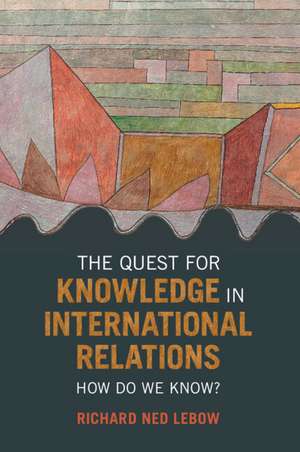The Quest for Knowledge in International Relations: How Do We Know?
Autor Richard Ned Lebowen Limba Engleză Paperback – 13 apr 2022
| Toate formatele și edițiile | Preț | Express |
|---|---|---|
| Paperback (1) | 237.22 lei 3-5 săpt. | +13.25 lei 7-13 zile |
| Cambridge University Press – 13 apr 2022 | 237.22 lei 3-5 săpt. | +13.25 lei 7-13 zile |
| Hardback (1) | 526.18 lei 6-8 săpt. | |
| Cambridge University Press – 13 apr 2022 | 526.18 lei 6-8 săpt. |
Preț: 237.22 lei
Nou
Puncte Express: 356
Preț estimativ în valută:
45.39€ • 47.39$ • 37.57£
45.39€ • 47.39$ • 37.57£
Carte disponibilă
Livrare economică 14-28 martie
Livrare express 28 februarie-06 martie pentru 23.24 lei
Preluare comenzi: 021 569.72.76
Specificații
ISBN-13: 9781009102919
ISBN-10: 1009102915
Pagini: 320
Dimensiuni: 151 x 228 x 15 mm
Greutate: 0.35 kg
Ediția:Nouă
Editura: Cambridge University Press
Colecția Cambridge University Press
Locul publicării:Cambridge, United Kingdom
ISBN-10: 1009102915
Pagini: 320
Dimensiuni: 151 x 228 x 15 mm
Greutate: 0.35 kg
Ediția:Nouă
Editura: Cambridge University Press
Colecția Cambridge University Press
Locul publicării:Cambridge, United Kingdom
Cuprins
Preface; 1. Introduction; 2. What is knowledge?; 3. Positivism and interpretivism; 4. Positivism: Correlational research; 5. Positivism: Experiments; 6. Positivism: Rationalism; 7. Interpretivism: Causal narratives; 8. Interpretivism: Practice turn; 9. Counterfactuals; 10. Verification vs. Falsification; 11. Causal and non-causal narratives; 12. Reason; 13. Cause; 14. The causal paradox; 15. Mechanisms; 16. International relations as an ethical practice.
Recenzii
'Lebow offers an impressively grand tour of important debates and distinctions in IR, seasoned with his own eyewitness accounts as a participant in many of the discussions he surveys. He also doubles down on the the project of defining and pulling together a relatively coherent 'interpretivist' approach to juxtapose to a 'positivist' canon. Does the campaign succeed? Read the book and judge for yourself!' Patrick Thaddeus Jackson, American University
'Ned Lebow's Quest for Knowledge asks what scholars can come to know about international relations. Lebow provides a powerful argument advancing his highly-nuanced interpretivist-reflectivist methodology. At the same time, Quest surveys the range of current methodological approaches, highlighting the strengths and weaknesses of each, including his own version of interpretivism. Methodology is, as Lebow rightly observes, only the tip of an iceberg, in that each approach is built upon a complex of metaphysical and epistemological premises - premises that the book makes explicit. Quest for Knowledge is another superb scholarly work by Lebow, and is essential reading for anyone interested in the legitimacy of various social science methods.' Fred Chernoff, Harvey Picker Professor of International Relations, Colgate University
'Ned Lebow's Quest for Knowledge asks what scholars can come to know about international relations. Lebow provides a powerful argument advancing his highly-nuanced interpretivist-reflectivist methodology. At the same time, Quest surveys the range of current methodological approaches, highlighting the strengths and weaknesses of each, including his own version of interpretivism. Methodology is, as Lebow rightly observes, only the tip of an iceberg, in that each approach is built upon a complex of metaphysical and epistemological premises - premises that the book makes explicit. Quest for Knowledge is another superb scholarly work by Lebow, and is essential reading for anyone interested in the legitimacy of various social science methods.' Fred Chernoff, Harvey Picker Professor of International Relations, Colgate University
Notă biografică
Descriere
Lebow asks what kinds of knowledge international relations theories seek? How do they search for it and claim to have found it?
